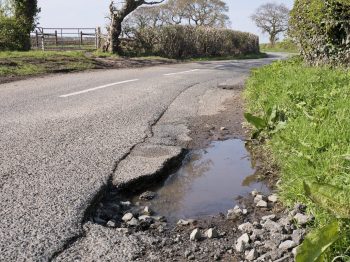Spring Budget 2023: Main points for fleets
Following yesterday’s speech by the Chancellor on his ‘Budget for growth’, Fleet World looks at the main points for fleets.
This year’s Spring Budget was, as expected by many, lacking in major announcements for fleets but there were several key points for the sector – and a few where details had been called for but failed to materialise.
Fuel duty freeze

The current freeze on fuel duty and the temporary 5p cut introduced last year will be maintained for the next year
The Government confirmed that the current freeze on fuel duty and the temporary 5p cut introduced last year will be maintained for the next year, bringing relief to drivers.
RAC head of roads policy Nicholas Lyes welcomed the decision to keep the 5p fuel duty cut in place for another 12 months.
“The cut has given drivers some much-needed relief in what has been the most torrid year ever at the pumps, with price records being broken even after duty was cut.
“Given the importance of driving for consumers and businesses, duty should be kept low to help fight inflation.”
For more details, click here.
Super-Deduction replaced with ‘full expensing’ tax break

The full expensing policy means every pound invested in eligible technology, plant or machinery is fully deductible from taxable profits
Chancellor Jeremy Hunt has replaced the current Super-Deduction tax relief with a new policy of “full expensing” for qualifying equipment and machinery, including fleet vans/trucks.
The full expensing policy means every pound invested in eligible technology, plant or machinery is fully deductible from taxable profits.
The new tax break runs until 31 March 2026 and means every pound invested in eligible technology, plant or machinery is fully deductible from taxable profits. Under full expensing, for every pound a company invests, their taxes are cut by up to 25p.
While there were initially no details to show that the new scheme now includes rental and leasing – despite calls from leading trade associations – the Government has now indicated to the BVRLA that it will work with the industry to develop a policy solution that includes this key vehicle acquisition method for the first time, bringing a “fleet-friendly” capital allowance.
For more details on full expensing, click here. The Government’s pledge to the BVRLA that it will develop a tax break open to the rental and leasing sector is here.
Extra £200m funding for potholes

The extra £200m for 2023/4 will help tackle “the curse of potholes”
The Chancellor upped pothole funding with an extra £200m for 2023/4 to help tackle “the curse of potholes”.
Jeremy Hunt said: “The Spending Review allocated £500m every year to the Potholes Fund but today I have decided to increase that fund by a further £200m next year to help local communities tackle this problem.”
However, the AA has expressed concern that the cash won’t become available until next year.
Jack Cousens, head of roads policy, outlined: “Years of underinvestment in our road network coupled with a cold and wet winter is already unveiling the craters. More money needs to be spent now, as well as significant long-term investment to improve our local roads.”
For more details, click here.
Energy Price Guarantee extended but lack of EV sector support
Hopes for support to strengthen the UK’s electric vehicle sector and charging infrastructure were dashed, leaving many in the fleet and EV industries disappointed.
There had been many calls for action, including work to address the lack of charging infrastructure and a campaign to axe the EV ‘Pavement Tax’, equalising the VAT rates for public (20%) and home (5%) EV charging so that those unable to charge at home are not unfairly disadvantaged.
The UK auto sector also suggested that the Government had failed to provide much-needed help to help the UK compete with “the massive packages of support to power a green transition that are available elsewhere”.
However, the Extended Energy Price Guarantee was seen as “a tremendous boon for EV drivers”.
For more details, click here.
Road pricing conspicuous by absence

The lack of action on road pricing is seen as “dismaying”
While experts have been saying for years that the Government must start tackling a £35bn ‘fiscal black hole’ in VED and fuel duty from the switch to electric vehicles by implementing road pricing, the Spring Budget was devoid of any reference to plans.
LeasePlan’s Matthew Walters, head of consultancy services and customer value, said the lack of action was dismaying for two reasons.
“The first: if the biggest shake-up of motoring taxation in generations is going to happen ahead of 2030 – as it surely must – then it will need years of careful development and implementation. There is no real cause to delay that process now.
“The other reason is that there’s now an increasingly long list of legislation or potential legislation that we’re still waiting for – from the necessary detail on the ZEV Mandate for manufacturers to a new system of VED for vans. Fleets and motorists need clarity on these and other issues to properly plan for the future.”
For more details, click here. For LeasePlan’s full comment, click here.
Fleet sector reaction to the Budget

Paul Hollick, chairman, Association of Fleet Professionals
Paul Hollick, chairman at the Association of Fleet Professionals
“For fleets, this was a Budget more noteworthy for what it didn’t include rather than what it did. We’d have liked to have seen measures announced ranging from the creation of an EV charging regulator through to national co-ordination on Clean Air Zones, as outlined in our recent tax and regulation manifesto. However, there was little content that showed the Government has been thinking about business road transport.
“The one bright point for fleets was the freeze in fuel duty. An increase in 11 pence per litre would’ve been extremely unwelcome at a point in time when the economy is struggling and removing that possibility is very much welcome. Further positives are difficult to identify but a recognition that more people need to be encouraged back into the workforce, through pension changes and childcare measures, could potentially help to a degree in a fleet sector where recruitment remains an issue.”

LeasePlan’s Matthew Walters
Matthew Walters, head of consultancy services and customer value at LeasePlan UK
“The UK has so far avoided a recession in 2023 – and the economic forecasts in this Budget, particularly those concerning inflation, were better than we might once have feared.
“However, it’s important to emphasise that we, as a country, are not out of the woods yet. There are still the ongoing effects of Brexit and the pandemic – and growth is expected to be sluggish, at best, for some time to come. This continues to be a challenging period for many businesses and individuals.
“We also know that the fleet industry is well placed to overcome these challenges, just as we have overcome similar in the past. Not only did we account for almost half of all new car sales in 2022, but we are also leading the adoption of the cleaner motoring technologies that will define the future.”

Jon Lawes, managing director of Novuna Vehicle Solutions
Jon Lawes, managing director, Novuna Vehicle Solutions
“The fuel duty freeze and continued 5ppl reduction will be critical in assisting the growth of business fleets across the UK. Without this action from the Chancellor today, fleet businesses would have faced significant operating costs this spring.
“The decision not to lower the VAT on public electric vehicle chargers or improve EV infrastructure, on the other hand, is disappointing. A VAT cut would level the playing field for those who are unable to charge their vehicles at home due to a lack of off-street parking or an inability to install a home charge point. Furthermore, with the current number of public charging stations unable to meet EV demand, implementing a plan to increase public chargers could have aided in overcoming some of the EV industry’s challenges.
“The Chancellor should have taken more direct action on EV infrastructure. The current system is unfit for 2030 goals and the industry has once again been left without a clear direction.”














